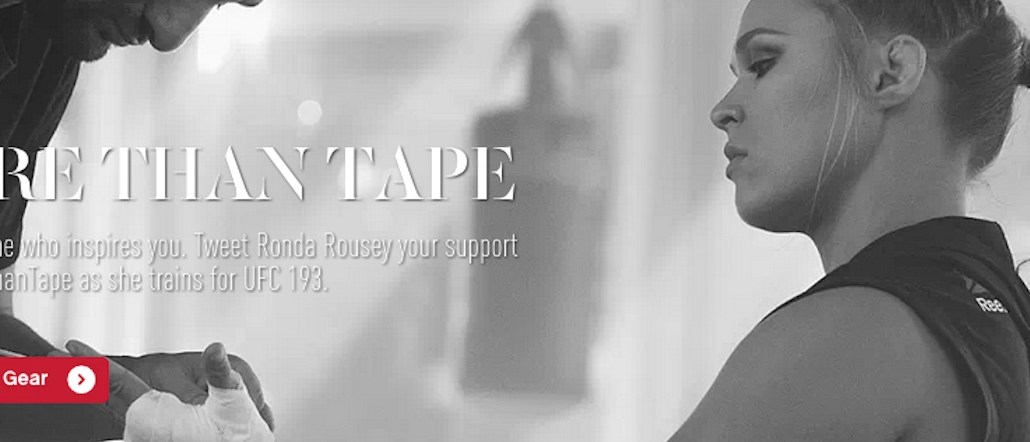Secure your place at the Digiday Media Buying Summit in Nashville, March 2-4

This month, Reebok announced a new social campaign. The athletic-wear company asked fans to send messages of support for UFC champ Ronda Rousey to @Reebok with #MoreThanTape, that will be printed on handwraps to be given to her before her next fight.
And the campaign, created by Venables Bell & Partners, has already gotten millions of impressions. The Instagram post announcing the campaign was Reebok’s top post in the past quarter, with almost 14,000 likes.
It’s a far cry from a few years ago, when Reebok’s biggest problem was a hodgepodge of social media channels from different country and market managers. There were almost 600 social media accounts for Reebok, many of them fan-created, with no control by the brand. And there was no concerted effort to take advantage of social media’s relationship-building potential.
“Yes, we’re in the business of selling shoes,” said Ben Blakesley, who heads social media marketing for Reebok. “But if that’s all we did, and that’s all we used social for, we wouldn’t be here.”
Today, Reebok is taking a quality-over-quantity approach. Since revamping the program 18 months ago to focus on relationship building, Blakesley said, the brand has seen an 8,000 percent growth in engagement numbers. On Instagram alone, the brand has gone from less than 2,000 followers to more than half a million in two years.
Unmetric crunched data for Digiday that showed that Reebok had a 163 percent increase in followers on Instagram, the highest among its competitors.
One thing that hasn’t fueled Reebok’s social media growth spurt: Facebook. The brand has essentially moved away from organic marketing on Facebook, said Blakesley. Because of Facebook’s algorithm changes, Reebok, along with other brands, are finding that reach is miniscule. “Facebook just doesn’t work for us as an organic channel, just as a paid media channel,” he said. “It’s a pay-to-play mentality, which is the opposite of what we’re trying to do.”
Instead, Reebok has focused heavily on Instagram. It has 530,000 Instagram likes on its main @Reebok channel. The brand joins many other social brands that have found serious uptake on Instagram, thanks to hard-core users who are there for the photos. Blakesley divided Reebok’s Instagram community into three channels: “classic,” “women’s” and “brand community.” His favorite right now is women’s, which focuses on in-the-moment lifestyle imagery and tie-ins with specific sports events such as Crossfit championships, Spartan Races or the UFC.
And on Twitter, it has focused on using the platform for conversations, but in unexpected ways.
That includes the Rousey campaign but also others, like a Twitter Human Dispatch Service stunt also by Venables Bell & Partners, where New Yorkers could tweet shoe sizes and addresses and got their shoes delivered to them by runners around the city. That got 195 million Twitter impressions. Another one, which delivered bacon to paleo-dieters at the Reebok CrossFit Games, got 25.7 million impressions.
Figuring out how to use all the social channels well is the hard part. The brand stays active on Twitter, Instagram and Pinterest, but Blakesley is OK not having a real presence on what he calls “closed” social platforms like WhatsApp, WeChat and Snapchat. “It doesn’t matter if we’re not on Snapchat, as long as they’re talking about us on there. That’s going to be the next thing for social media to figure out.”
Image courtesy of Reebok.
More in Marketing

Thrive Market’s Amina Pasha believes brands that focus on trust will win in an AI-first world
Amina Pasha, CMO at Thrive Market, believes building trust can help brands differentiate themselves.

Despite flight to fame, celeb talent isn’t as sure a bet as CMOs think
Brands are leaning more heavily on celebrity talent in advertising. Marketers see guaranteed wins in working with big names, but there are hidden risks.

With AI backlash building, marketers reconsider their approach
With AI hype giving way to skepticism, advertisers are reassessing how the technology fits into their workflows and brand positioning.





